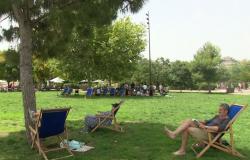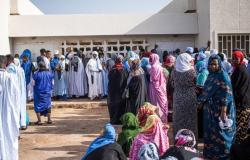Even if it is up slightly compared to 2019, the participation rate in the European elections in Latvia (33.7%) reflects the persistent disinterest of Latvian voters in the European vote.
ADVERTISEMENT
This is not a general trend for the EU, but a signal: while Latvians were called to the polls this Saturday to nominate their MEPs, the participation rate remained low (at 33.7%) according to the Commission Central Election of Latvia (CVK). Even if this figure is a slight increase compared to 2019 data, when 33.5% of voters went to the polls, more than 66% of voters again avoided the polls.
These disappointing results contradict a Eurobarometer survey carried out last April, in which 65% of Latvians declared themselves ready to get involved in the elections and to vote.
The CVK said the vote took place without incident, but serious technical problems affected turnout data. This led several news outlets to report that turnout had exceeded 2019. These articles were later retracted.
According to opinion polls carried out in February and May by the Norstat research center in collaboration with public broadcaster LSM, around a third of respondents said they were not interested in the European elections.
Respondents aged 18 to 29 were most likely to say they did not intend to follow the elections, while older respondents, aged 60 to 74, were more likely to say they did not intend to follow the elections. interested in it.
In Latvia, 16 lists competed to win the 9 vacant seats allocated to the country. Data collected before polling day indicated that the center-right National Alliance party was leading in the polls.
The left-wing progressives are in second place and Prime Minister Evika Siliņa’s centrist New Unity party is in third place.
The National Alliance campaigned promising to “defend Latvia’s interests in the EU, not the EU’s interests in Latvia.”
It says all EU member states should spend at least 2% of their GDP on defense and advocates strengthening the EU’s eastern border against illegal immigration and military threats.
The party’s main candidate is Roberts Zīle, an MEP for 20 years and current vice-president of the European Parliament.
The social-democratic Progressives party advocates support for Ukraine, notably by giving it access to EU markets and granting it observer status in the European Parliament. Progressives also call for stricter environmental controls and investments in railroads rather than airlines.
The leading candidate is former presidential candidate Elīna Pinto.
The New Unity party has been very clear on its position on security.
“Russia has been, is and will be a Source of instability and a military threat to all of Europe, both in the near and distant future“, indicates a party press release.
The latter has been very strong in his condemnation of Russia’s invasion of Ukraine and is also in favor of EU enlargement. Its main candidate is outgoing European Commissioner Valdis Dombrovskis.
Last month, protests took place in Latvia against the national broadcaster’s decision to hold some pre-election debates in Russian.
Latvia is located on the eastern edge of the EU and shares a border with Russia. According to data from the Central Bureau of Statistics, more than 60% of Latvians speak Latvian, but Russian speakers represent a significant minority of around a third.
National broadcaster LSM provides some content in Russian and the Public Council for Electronic Mass Media has been asked to block Russian-language debates, which the body has refused to do, saying it would mean interference in programming and broadcasts. LSM decisions.
Security, especially after Russia’s invasion of Ukraine in 2022, is an important issue for many Latvians. The small Baltic country was annexed by the Soviet Union until its collapse in 1991, and today many Latvians fear a revisionist Russia.
This prompted the government to reintroduce conscription last year, a move which received widespread public support. According to a study, 60% of respondents consider conscription to be crucial for the defense of Latvia, which shares a 200-kilometer border with Russia.






